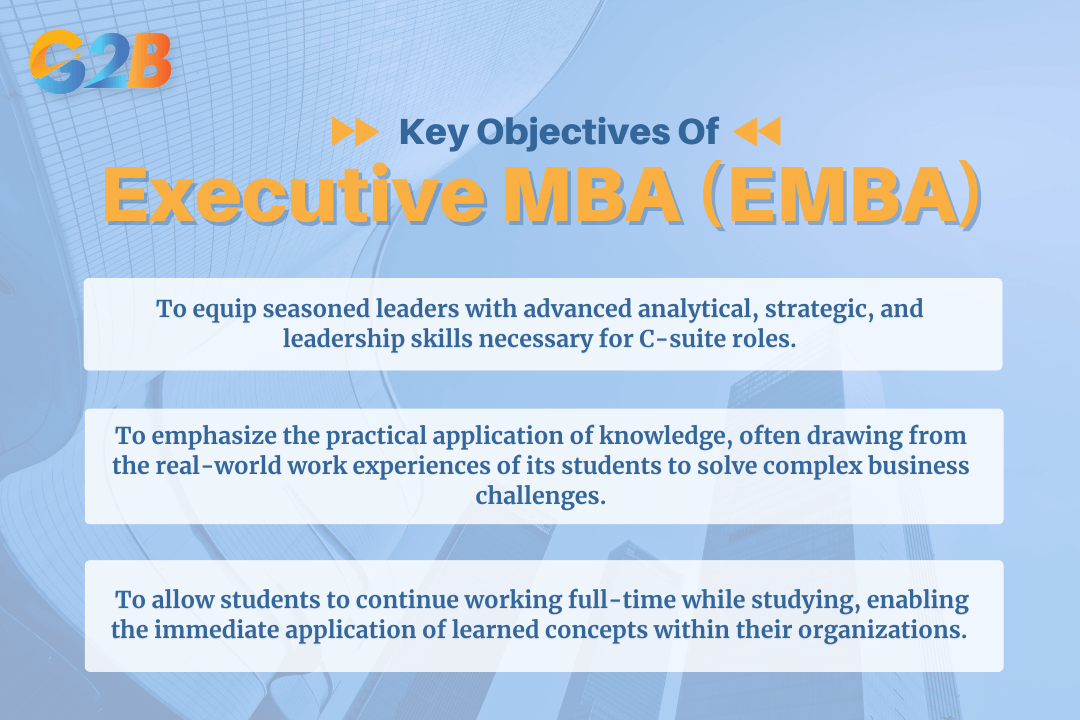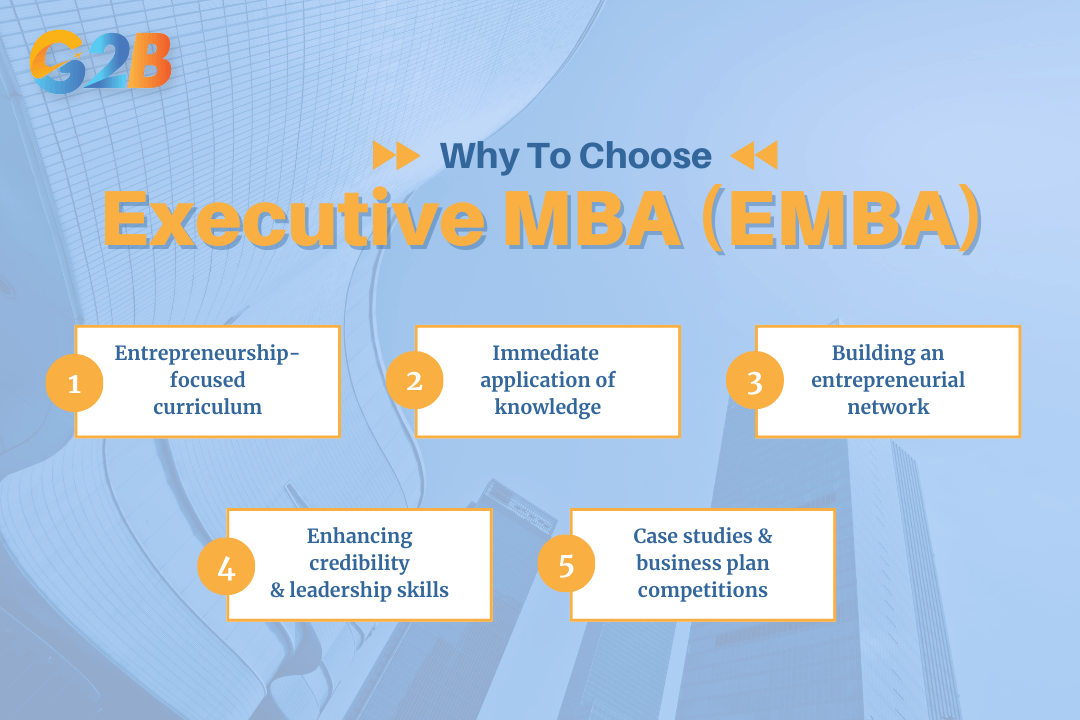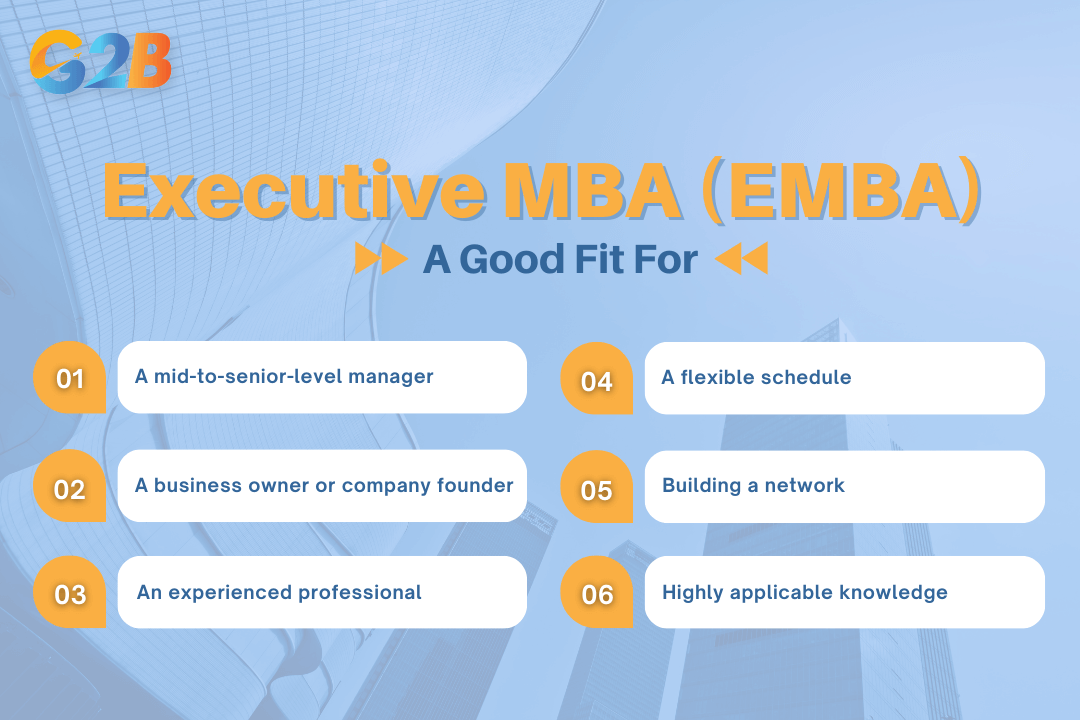Among the most prestigious pathways, the Executive MBA (EMBA) stands out as a transformative program tailored for experienced executives and managers. Designed to balance rigorous academic training with practical application, the EMBA empowers leaders to elevate decision-making, foster innovation, and navigate complex challenges in a highly competitive market.
This article outlines the key aspects of the Executive MBA (EMBA) to help professionals gain a clearer understanding. We specialize in company formation and related business services, and do not provide educational or career counseling. For academic guidance, please consult a qualified education expert or institution.
What is an Executive MBA (EMBA)?
An EMBA is a Master of Business Administration program specifically designed for mid- to senior-level professionals with significant managerial and leadership experience. Unlike traditional MBA programs that often cater to early-career individuals, the EMBA is tailored to accommodate the demanding schedules of established leaders, allowing them to pursue advanced education without pausing their careers.
- Key objectives of an EMBA program:
- To equip seasoned leaders with advanced analytical, strategic, and leadership skills necessary for C-suite roles.
- To emphasize the practical application of knowledge, often drawing from the real-world work experiences of its students to solve complex business challenges.
- To allow students to continue working full-time while studying, enabling the immediate application of learned concepts within their organizations.

There are 3 key objectives of an EMBA program
- Program structure and format:
- Flexible schedule: To accommodate the professional lives of its participants, classes are typically held on weekends, evenings, or in intensive modular formats with block sessions.
- Cohort-based learning: Students progress through the program as a unified group, which fosters deep collaboration, invaluable peer-to-peer learning, and the formation of a powerful professional network.
- Duration: Most EMBA programs are designed to be completed in a condensed timeframe, usually between 18 to 24 months, depending on the institution.
Detailed comparison between EMBA and MBA
Choosing between an EMBA and a traditional MBA depends heavily on an individual's career stage, experience, and future goals. While both grant a Master of Business Administration degree, their structure, focus, and student demographics are distinctly different.
| Criteria | EMBA (Executive MBA) | MBA (Master of Business Administration) |
|---|---|---|
| Student profile and experience requirements | Designed for more experienced professionals, typically with 8-15 years of work experience, including several years in a management or leadership role. The average age of EMBA students is generally higher. | Geared towards early-career professionals with approximately 2-5 years of work experience. It often attracts individuals seeking to accelerate their careers or pivot to a new industry or function. |
| Curriculum and focus | The curriculum is more focused on high-level strategy, executive leadership, and complex decision-making. It leverages the extensive experience of the cohort, with assignments frequently tied to real-world challenges in their current companies. | Provides a broad and foundational business education covering core disciplines like finance, marketing, and operations, with numerous opportunities for specialization through elective courses. |
| Learning environment and network | The learning environment is highly collaborative, with a network composed of senior leaders, executives, and entrepreneurs from a wide array of industries. This offers unparalleled peer-to-peer networking opportunities with established professionals. | The network is diverse and extensive but consists primarily of professionals at an earlier stage in their careers. The environment is immersive and typically requires a full-time commitment, halting employment. |
| Career goals | Primarily aimed at career advancement within a current organization or industry, developing executive leadership skills, and filling specific knowledge gaps to prepare for C-suite positions. | Often pursued by individuals looking to enter the management track at a higher level, make a significant career change, or specialize in a particular area of business to enhance their marketability. |
Why CEOs and entrepreneurs should choose an EMBA
For CEOs, entrepreneurs, and senior-level executives, the decision to pursue an EMBA is a strategic move to sharpen leadership acumen and drive business growth. The program's structure and content are uniquely suited to the challenges and opportunities faced by those at the helm of an organization.
An EMBA offers a curriculum that bridges the gap between extensive professional experience and advanced leadership skills. It provides a formal framework for the intuitive decisions many seasoned leaders make, enhancing their strategic thinking and business acumen.
- Entrepreneurship-focused curriculum: Many EMBA programs offer elective courses or concentrations focused on entrepreneurship and innovation. These tracks cover topics essential for launching and scaling a business, such as business strategy, managerial finance, fundraising, new product development, and technology strategy. Courses like "Entrepreneurial Venture Creation" often guide students through the process of developing comprehensive business plans.
- Immediate application of knowledge: A key advantage for active CEOs and entrepreneurs is the ability to immediately apply classroom learnings to their own businesses. Projects, case studies, and assignments can often be tailored to address the real-world operational and strategic challenges their companies are facing, providing instant ROI.
- Building an entrepreneurial network: The EMBA cohort is a diverse, curated network of experienced professionals from various industries and regions, offering access to a community that can be a goldmine for entrepreneurs. Classmates can become future co-founders, trusted advisors, seed investors, or even major clients. The diverse industry backgrounds within the cohort provide fresh perspectives and potential partnership opportunities.
- Enhancing credibility and leadership skills: Graduating from a reputable EMBA program enhances an entrepreneur's and executive's credibility with investors and partners, which is a significant asset when seeking venture capital funding or forging strategic partnerships. The program's intensive focus on leadership development hones the strategic decision-making and communication skills that are critical for guiding a company through periods of rapid growth.
- Case studies and business plan competitions: Many programs feature business plan competitions as a capstone experience, allowing students to pitch their venture ideas to a panel of venture capitalists, angel investors, and industry veterans. This provides invaluable feedback, exposure, and in some cases, crucial seed funding.
Explore the differences between Angel Investors and Venture Capital

Why CEOs and entrepreneurs should choose an EMBA
Is an EMBA right for you?
Determining if an Executive MBA is the correct path requires a careful evaluation of your career trajectory, professional experience, and long-term ambitions.
An EMBA would be a good fit if you are:
- A mid-to-senior-level manager: This includes roles such as directors, department heads, project managers, and branch managers who are looking to move into higher executive positions.
- A business owner or company founder: Individuals currently running their own enterprises who seek to systematize their management knowledge to achieve sustainable growth and scale their operations.
- An experienced professional: Individuals like doctors, engineers, or lawyers who have substantial work experience and have transitioned into leadership or management roles within their respective fields.
Additionally, an EMBA is suitable if your needs include:
- A flexible schedule: The weekend or modular format of an EMBA is explicitly designed for busy professionals who cannot afford to step away from their careers.
- Building a network: One of the most significant assets of an EMBA is the high-caliber network you build. Students learn from and forge lasting relationships with other accomplished leaders from a diverse range of industries and sectors.
- Practical, highly applicable knowledge: The EMBA curriculum is less theoretical and more focused on real-world business challenges, often using the case study method. This allows students to directly apply what they learn to their jobs in real time.
Note: An EMBA is not an option for recent graduates but rather a strategic investment for those who have already established a successful career and want to reach the next level.

Determining if an Executive MBA is the correct path requires a careful evaluation
FAQs about EMBA
To help prospective candidates better navigate their options, we have compiled a list of frequently asked questions about the Executive MBA (EMBA). These insights address the program’s features and key considerations for experienced professionals.
What features of an EMBA help in navigating the legal and business environment?
An EMBA program, particularly one with a global focus or located in a specific region like Vietnam, often incorporates courses and case studies on conducting business in diverse and emerging markets. The curriculum provides updated, practical and sophisticated analytical frameworks to evaluate legal, political, and economic risks. This knowledge empowers you to make well-informed decisions regarding the most appropriate business entity, operational structure, and risk mitigation strategies for a given context, ensuring compliance and competitive advantage.
How can an EMBA help a person build a local network?
Enrolling in a reputable EMBA program within a specific region, such as those offered by RMIT or Fulbright in Vietnam, provides unparalleled access to the local business ecosystem. Through cohort interactions, guest lectures, and alumni events, you connect with influential local business leaders, government officials, and industry experts. This embedded network is invaluable for understanding the nuanced, "unwritten rules" of the local market, but also for building international connections through global immersion programs.
What role does an EMBA play in developing a market adaptation strategy?
An EMBA curriculum equips you with the tools to perform rigorous market analysis, understand local consumer behavior, and develop a marketing and operational strategy tailored to specific cultural and economic conditions. Course projects and case studies provide a practical platform to research, design, and refine a market entry or adaptation plan for your own company in a specific market, like Vietnam, using real-world data and receiving expert faculty feedback.
How can an EMBA help with investor readiness in Delaware?
EMBA courses in corporate finance, venture capital, and fundraising provide a deep understanding of what investors, particularly VCs, look for in a startup. You will learn to construct a clear capital structure, manage a sound capitalization (cap) table, and implement standard corporate governance terms that are expected in the investment community. This knowledge clarifies why incorporating in Delaware is a strategic move to attract institutional capital and positions you to confidently navigate the fundraising process.
How can an EMBA help with corporate governance in Delaware?
A key component of an EMBA education is corporate governance. The curriculum delves into board structures, shareholder voting rights, and the fiduciary duties of directors and officers. This knowledge is crucial for establishing a solid governance framework from the very beginning, ensuring your company adheres to the high standards that investors, partners, and regulatory bodies expect from a Delaware C-corporation.
How can an EMBA help with an exit strategy in Delaware?
Strategic thinking is at the core of an EMBA program. The curriculum encourages you to consider the company's long-term trajectory and ultimate goals from its inception. You will learn valuation methodologies, merger and acquisition (M&A) processes, and the factors that make a company attractive to potential buyers. This foresight, combined with the strategic decision to incorporate in Delaware - a preferred state for M&A and IPOs - helps you build a company that is not just profitable but also strategically positioned for a successful future exit.
The Executive MBA (EMBA) is more than just an advanced academic qualification. It is a transformative journey that empowers seasoned professionals to elevate their leadership, expand their global outlook, and drive lasting impact within their organizations. By combining rigorous coursework with real-world application, the EMBA equips executives with the tools and perspectives needed to thrive in today’s complex and competitive business environment.


 Delaware (USA)
Delaware (USA)  Vietnam
Vietnam  Singapore
Singapore  Hong Kong
Hong Kong  Ras Al Khaimah (UAE)
Ras Al Khaimah (UAE)  United Kingdom
United Kingdom 
